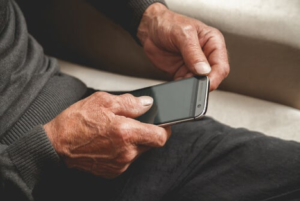Mobile Apps May Help with Alzheimer's

You probably use mobile apps every day. Indeed, these apps can be so helpful that it makes sense that they could also help with all types of dementia. This article centers on how mobile apps may help with Alzheimer’s disease.
Alzheimer’s disease is a progressive neurodegenerative disease that’s characterized by cognitive and behavioral impairment. It usually appears in adulthood, particularly in old age (Valls-Pedret, Molinuevo, & Rami (2010)).
As the disease progresses, the sufferer loses both their autonomy and independence. Consequently, this often leads to a decline in both the patient’s and their family’s quality of life.
However, no treatment for this type of dementia is 100 percent effective. In fact, the best kind of treatment is a combined drug and non-drug therapy. Included in these treatments are ICT related therapies.
These ICT treatments tend to be resources, tools, and programs. They’re used to process, manage, and share information through various technological means such as computers, mobile phones, tablets, etc. (Rodriguez, S., 2016).
These resources, especially mobile apps, really help professionals who work with Alzheimer’s patients. For example, they support the development, follow-up, and achievement of certain treatments and their goals.

Types of mobile apps that may help with Alzheimer’s
A mobile application is a program or software you download and access from your smartphone or other mobile devices (Gosalvez, D. and Rodero, D., 2012). According to Delia, Galdamez, Thomas, & Pesado (2013), there are three types of applications:
Web applications
These are designed to run in the browser of the mobile device. In fact, they’re developed using the same technology to create websites. Plus, the best thing about them is that you can use them with different browsers.
Native applications
These are designed to run on a specific platform. Therefore, you need to take into account the type of device, its version, and the operating system you’re using.
Hybrid applications
Finally, this type combines the best of the two previous kinds. Consequently, they’re the ideal application because they can adapt to any mobile device.
Areas in which mobile apps may help with Alzheimer’s
Monteagudo (2012) states that mobile apps may be used in different areas:
- Investigation.
- Diagnosis.
- Treatment.
- Prevention.
- Health and social care.
- Improving the quality of life of both patients and their families.

How mobile apps may help with Alzheimer’s
Telediagnosis
You can identify symptoms and irregularities remotely. In addition, you can extend the coverage to 24 hours a day, 365 days a year. Furthermore, mobile apps in telediagnosis could be invaluable in diagnosing Alzheimer’s early.
Telemonitorization
You can track the patient from a distance. Thus, the health professionals can pay more attention to the health care and treatments they carry out. Furthermore, you can use telemonitoring as a complementary procedure to telediagnosis.
To help the carer
Unfortunately, the carer always carries the greatest burden. However, mobile apps that are currently available can really help them. For instance, the carer can source information of interest, locate the patient, or find a support group to rely on.
Monitoring the basic and instrumental daily life activities and patients’ progress
You can monitor how the illness progresses and develops. Therefore, results of cognitive function tests can be assessed.
Also, you can monitor patients’ progress in various nominated tasks.
Users gain independence and autonomy
With some of these applications, the user can locate and find the patient. Furthermore, they can identify others who might be very close by.
In conclusion, Alzheimer’s patients and their families may really benefit from using health and social care mobile apps. Furthermore, mobile apps can make carrying out therapeutic processes much easier.
You probably use mobile apps every day. Indeed, these apps can be so helpful that it makes sense that they could also help with all types of dementia. This article centers on how mobile apps may help with Alzheimer’s disease.
Alzheimer’s disease is a progressive neurodegenerative disease that’s characterized by cognitive and behavioral impairment. It usually appears in adulthood, particularly in old age (Valls-Pedret, Molinuevo, & Rami (2010)).
As the disease progresses, the sufferer loses both their autonomy and independence. Consequently, this often leads to a decline in both the patient’s and their family’s quality of life.
However, no treatment for this type of dementia is 100 percent effective. In fact, the best kind of treatment is a combined drug and non-drug therapy. Included in these treatments are ICT related therapies.
These ICT treatments tend to be resources, tools, and programs. They’re used to process, manage, and share information through various technological means such as computers, mobile phones, tablets, etc. (Rodriguez, S., 2016).
These resources, especially mobile apps, really help professionals who work with Alzheimer’s patients. For example, they support the development, follow-up, and achievement of certain treatments and their goals.

Types of mobile apps that may help with Alzheimer’s
A mobile application is a program or software you download and access from your smartphone or other mobile devices (Gosalvez, D. and Rodero, D., 2012). According to Delia, Galdamez, Thomas, & Pesado (2013), there are three types of applications:
Web applications
These are designed to run in the browser of the mobile device. In fact, they’re developed using the same technology to create websites. Plus, the best thing about them is that you can use them with different browsers.
Native applications
These are designed to run on a specific platform. Therefore, you need to take into account the type of device, its version, and the operating system you’re using.
Hybrid applications
Finally, this type combines the best of the two previous kinds. Consequently, they’re the ideal application because they can adapt to any mobile device.
Areas in which mobile apps may help with Alzheimer’s
Monteagudo (2012) states that mobile apps may be used in different areas:
- Investigation.
- Diagnosis.
- Treatment.
- Prevention.
- Health and social care.
- Improving the quality of life of both patients and their families.

How mobile apps may help with Alzheimer’s
Telediagnosis
You can identify symptoms and irregularities remotely. In addition, you can extend the coverage to 24 hours a day, 365 days a year. Furthermore, mobile apps in telediagnosis could be invaluable in diagnosing Alzheimer’s early.
Telemonitorization
You can track the patient from a distance. Thus, the health professionals can pay more attention to the health care and treatments they carry out. Furthermore, you can use telemonitoring as a complementary procedure to telediagnosis.
To help the carer
Unfortunately, the carer always carries the greatest burden. However, mobile apps that are currently available can really help them. For instance, the carer can source information of interest, locate the patient, or find a support group to rely on.
Monitoring the basic and instrumental daily life activities and patients’ progress
You can monitor how the illness progresses and develops. Therefore, results of cognitive function tests can be assessed.
Also, you can monitor patients’ progress in various nominated tasks.
Users gain independence and autonomy
With some of these applications, the user can locate and find the patient. Furthermore, they can identify others who might be very close by.
In conclusion, Alzheimer’s patients and their families may really benefit from using health and social care mobile apps. Furthermore, mobile apps can make carrying out therapeutic processes much easier.
All cited sources were thoroughly reviewed by our team to ensure their quality, reliability, currency, and validity. The bibliography of this article was considered reliable and of academic or scientific accuracy.
- Aplicaciones para personas con demencia. Apps para cuidadores. Apps para profesionales. Recuperado el 6 de Marzo de 2019 de http://www.crealzheimer.es/crealzheimer_01/recursos/apps/apps_enfermos/index.htm
- Delia, L., Galdámez, N., Thomas, P., Pesado, P. (2013). Un análisis experimental de tipo de aplicaciones para dispositivos móviles. XVIII Congreso Argentino de Ciencias de la Computación.
- Gosálvez, D. y Rodero, D. (2012). Dispositivos móviles y apps sociosanitarias. Recuperado de http://www.easp.es/ideo/wp-content/uploads/2012/05/Disp_mov_apps_sociosan.pdf.
- Monteagudo, J L. (2012). Capacidades y oportunidades de innovación en tic para Alzheimer. Instituto de Salud Carlos III – Ministerio de Economía y Competitividad. Madrid: Unidad de Investigación en Telemedicina.
- Valls-Predet, C., Molinuevo, J L. y Rami, L. (2010). Diagnóstico precoz de la enfermedad de Alzheimer: fase prodrómica y preclínica. Revista Neurol 51, 471-80.
This text is provided for informational purposes only and does not replace consultation with a professional. If in doubt, consult your specialist.







